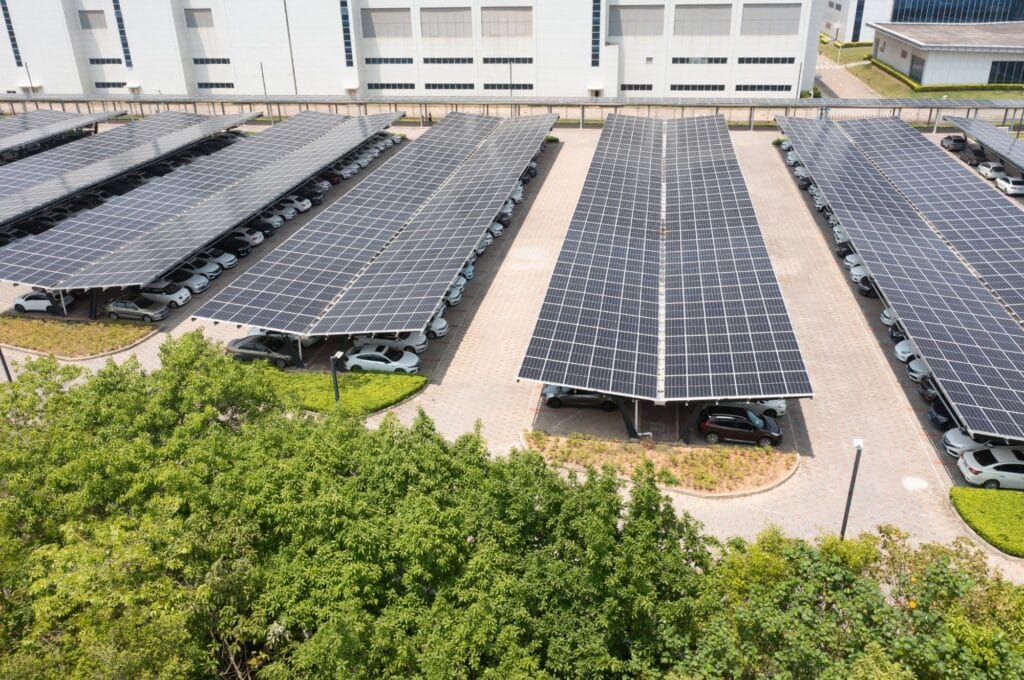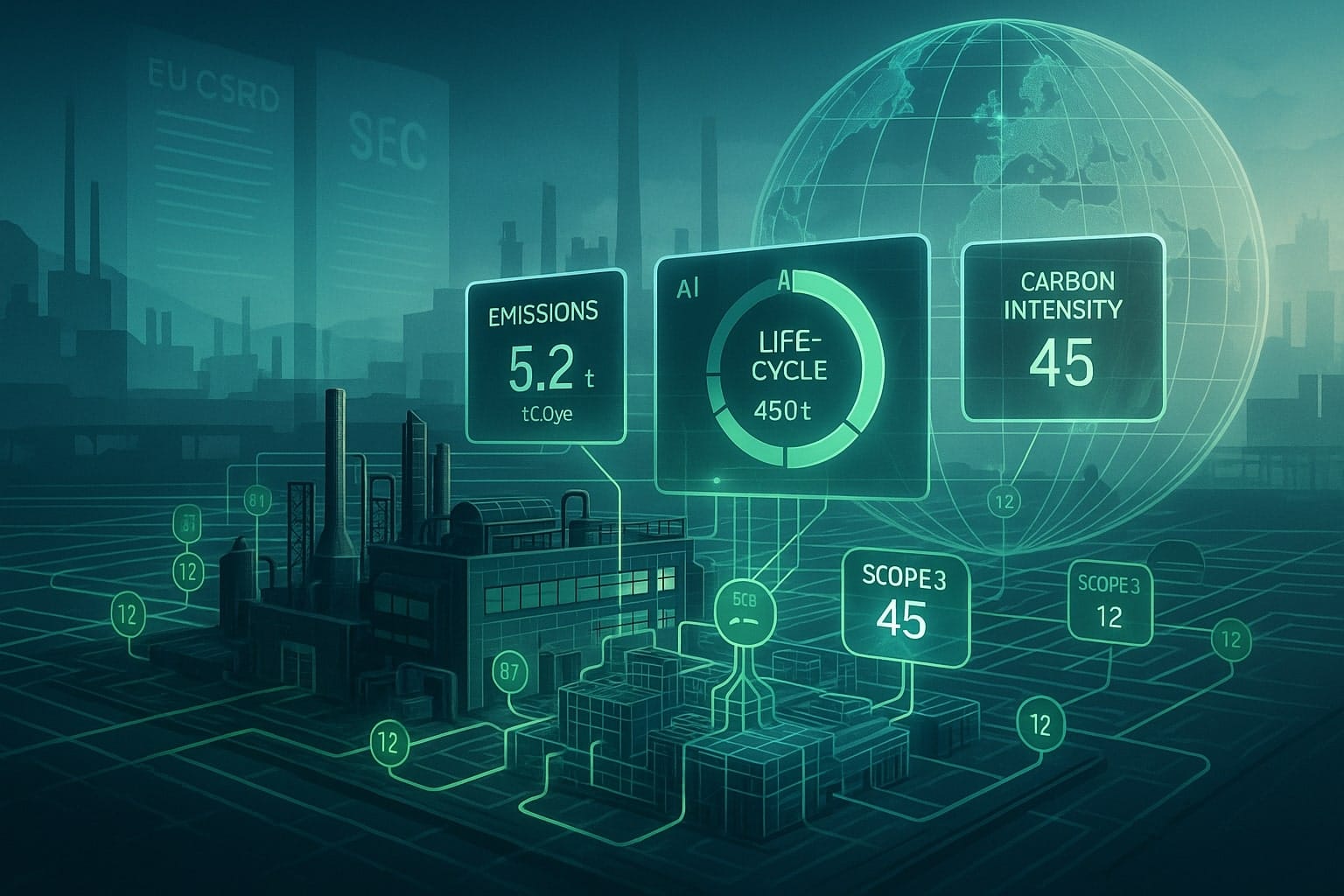Lithuania has taken a significant step towards renewable energy and sustainable transportation with the completion of the Baltic region’s largest solar carport, developed by Soliport. This carport, which boasts a capacity of 250 kW, powers 44 electric vehicle (EV) charging stations, making it a cornerstone project in the country’s clean energy transition. It not only supports Lithuania’s efforts to increase EV adoption but also sets a benchmark for solar-powered infrastructure in the region. The project highlights the synergy between renewable energy and electric mobility by primarily utilizing solar power for EV charging, reducing dependency on the traditional power grid.
Table of Contents
ToggleProject Overview
This solar carport, located strategically in a busy urban area, is designed to serve up to 4,000 electric vehicles per year. It incorporates advanced bifacial 580 W double-glass solar panels from JinkoSolar, paired with Solax inverters, making it highly efficient in harnessing solar energy. The carport is not only a functional power source but also a demonstration of Lithuania’s commitment to sustainable development, particularly in transportation. By utilizing a solar carport, this installation provides renewable energy for EV charging, helping reduce overall emissions and aligning with global sustainability targets.
Technical Details
- Solar Technology: The carport is equipped with bifacial panels, which are efficient as they capture sunlight from both sides, maximizing energy output. The system is grid-connected, yet it is designed to minimize grid reliance by primarily directing generated solar energy toward charging EVs.
- Charging Infrastructure: The 44 charging points were developed in collaboration with CityCharge, featuring dual 22 kW sockets and Tesla superchargers. This setup allows for fast, reliable charging, ensuring vehicles are charged with minimal wait times.
- Power Management System: To optimize energy usage and prevent overloading, a dynamic load management (DLM) system is in place. This system ensures that power is distributed efficiently, allowing the carport to operate at full capacity. This means that most of the energy generated is used directly for EV charging, with only a small amount fed back into the grid when necessary.

Environmental and Practical Benefits
Lithuania’s largest solar carport, with its capacity to charge 44 electric vehicles, brings significant environmental benefits. The use of solar energy drastically reduces the carbon footprint associated with electric vehicle charging by relying on renewable energy instead of the traditional grid, which may still include fossil fuel sources. By charging EVs through solar power, the installation offsets a considerable amount of carbon emissions, supporting Lithuania’s commitment to a greener transportation infrastructure.
Practically, the carport design is optimized for user convenience. It includes an underground foundation that preserves parking space and allows vehicles to park comfortably without compromising the surrounding infrastructure. Additionally, solar carports provide natural protection from weather elements, safeguarding EVs from rain and sun exposure. This setup is ideal for busy urban locations where the space efficiency and added shelter can enhance the user experience and support higher EV adoption rates in Lithuania.
Economic and Social Impact
Economically, this solar carport aligns with Lithuania’s broader goals of promoting sustainable mobility and reducing reliance on imported energy. The project contributes to the local economy by creating jobs in installation, maintenance, and operation while stimulating the green energy sector. It also leads to long-term cost savings by lowering the energy expenses associated with charging vehicles. For EV owners and fleet operators, this reduces the cost of operation, as solar energy is more affordable than electricity from conventional sources over time.
From a social perspective, the carport encourages the use of electric vehicles, which helps improve air quality and reduce noise pollution in urban areas. Additionally, as the carport is capable of charging around 4,000 EVs annually, it plays a role in supporting Lithuania’s goal to increase EV usage and move towards an eco-friendlier transportation model. Projects like these also contribute to public awareness about sustainable energy and may encourage more consumers to consider renewable energy solutions and electric vehicles.
Future Prospects and Expansion
Lithuania’s efforts with this solar carport are part of a larger strategy to expand renewable energy infrastructure and meet the rising demand for EV charging. The country plans to continue building EV charging stations, with a goal to install thousands more across public and private locations by 2030. This includes a mix of fast chargers on major highways and standard chargers in residential areas, funded in part by EU recovery funds. Future expansions of solar carports could incorporate battery storage, allowing excess energy to be stored for use during peak times, thus increasing the efficiency and resilience of the grid.
As these technologies become more widespread, similar projects could be adopted by other Baltic and European countries, enhancing cross-border connectivity for EVs. This will further integrate the region into the broader EU goals for climate neutrality by 2050, showcasing Lithuania’s commitment to a sustainable, renewable energy future.












